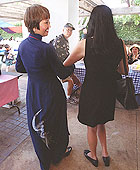By Walter Wright
Advertiser Staff Writer
If you are a woman looking for a new sense of style, there could be an ao dai in your future, according to a group of Vietnamese who modeled their national dress at McCoy Pavilion yesterday.
 |
| Kim Thu Ton, left, models traditional garb from Vietnam as Tu Creech shows a modern dress at the Vietnamese Women's Day celebration.
Deborah Booker • The Honolulu Advertiser |
The fashion show was a highlight of Vietnamese Women’s Day in Hawai‘i, which also marked the Hai Ba Trung holiday, honoring two legendary Vietnamese sisters who led a rebellion that drove the Chinese out of their country almost 2,000 years ago.
The ao dai (the d is pronounced almost like z or y), a simple dress slit on the sides to the waist to reveal flowing ankle-length pants, has survived the onslaught of Western garb in Vietnam, said Be Ho, 25, a state Health Department social worker who came to the Islands from Vietnam in 1991.
The garment is still worn by girls at school and women going about their daily errands, as well as on special occasions, she said.
But even Vietnamese women are somewhat hesitant to wear the traditional costume in Hawai‘i, except to go to temple or for parties, weddings and holidays, said Linda Thu Suong Thi Dang, a Kalihi hair stylist and wife of longline fishing captain Sung Van Nguyen.
Another of yesterday’s volunteer models said the dress is a natural for local weather, which is somewhat like Vietnam’s, and fits with Hawai‘i’s diverse cultural climate.
Jennifer Le, 29, a self-employed business systems consultant from Waikiki, said she is encouraging women to wear the dress in the workplace in modest corporate colors such as dark blue.
More dramatic fabrics, such as the myriad varieties from Vietnamese looms displayed at yesterday’s’ fashion show, are perfect for evening wear, said Le, recalling a San Francisco opera outing in red and gold.
Le, whose mother sent her to Barbizon modeling school "to keep me out of trouble," said the distinctive style reflects Vietnam’s position as a crossroads of culture, combining the partial side opening of the Chinese cheong-sam with the full side opening of some Indian and Pakistani garments that also are worn over pants, but in a looser cut.
Mrs. Jill Miller, the doyenne of Vietnamese culture who organized yesterday’s show, couldn’t say how the distinctive side slit evolved, but knows why: "It’s feminine," she said.
Or as fisherman Nguyen put it, "sexy."
[back to top] |

